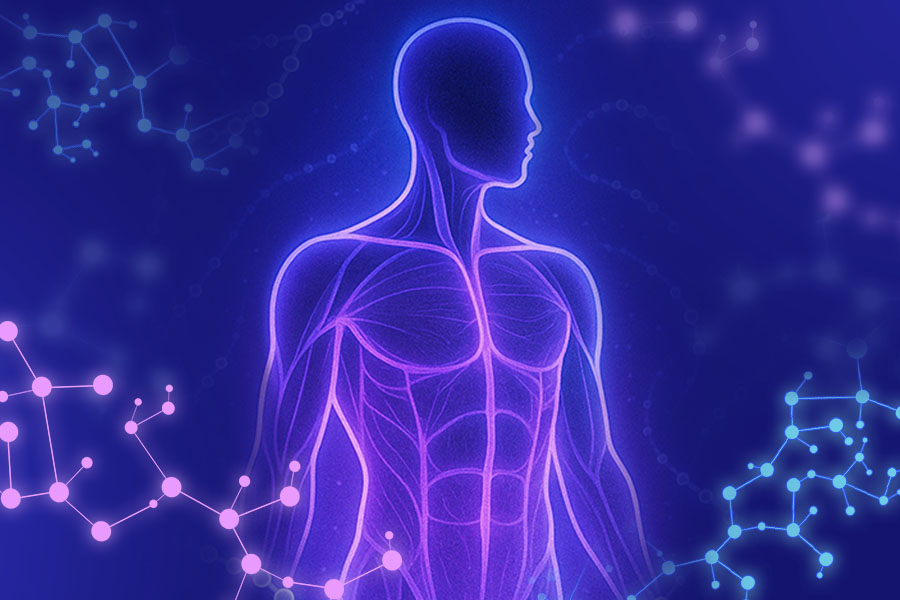The human body has an incredible ability to restore itself. When tissues experience stress whether from physical activity, daily strain, or minor injuries our cells immediately activate a complex recovery response. This involves the release of growth factors, blood vessel formation, and collagen remodeling to support strength and flexibility.
However, as we age or experience chronic stress, these natural signals can slow down. Research has shown that cellular communication plays a crucial role in how efficiently the body can respond to damage or inflammation. When this communication weakens, the repair process can become less effective.
What Are Peptides and Why They Matter
Peptides are short chains of amino acids, the same building blocks that form proteins in the body. In simple terms, they act like messengers, sending signals to cells to start or regulate specific biological functions such as recovery, metabolism, or immune response.
Scientific literature has increasingly explored how peptides influence the body’s signaling pathways. For example, peptides can support:
- Formation of new tissue and flexibility
- Regulation of inflammation for balanced recovery
- Healthy blood flow and nutrient circulation
- Collagen production in the skin, muscles, and tendons
Unlike synthetic drugs that override natural processes, peptides assist the body in doing what it already knows how to do just more efficiently. To understand how to select the right peptides for your body’s needs, explore our Understanding the Science of Recovery.
What Research Says About Peptides and Recovery
Early-stage clinical and preclinical studies have investigated how specific peptides interact with the body’s repair mechanisms.
- Gwyer et al. (2019) found that certain bioactive peptides can promote angiogenesis, or the development of new blood vessels, which is essential for tissue oxygenation and nutrient delivery.
- Józwiak et al. (2025) reviewed peptide compounds that may support collagen synthesis and cellular regeneration in connective tissues.
- Other data suggest peptides could help manage oxidative stress and maintain a balanced inflammatory response during the recovery process.
These findings don’t mean peptides “heal” or “cure.” Instead, they indicate that peptides may support the body’s natural communication systems involved in repair and recovery.
Peptide Therapy, A Guided Medical Approach
Peptide therapy refers to the clinical use of targeted peptides under professional supervision. At Nuri Clinic, each peptide program is:
- Clinician-guided and customized based on patient goals
- Compounded in U.S.-licensed pharmacies
- Shipped cold to preserve potency
- Approved under IRB research frameworks for quality assurance
This approach ensures every step from prescription to delivery is based on safety, evidence, and measurable outcomes. Peptide therapy is not a supplement guessing game. It’s a structured medical protocol designed to help support recovery, performance, and overall wellness.
Peptides vs. Steroids, Understanding the Difference
It’s common for people to confuse peptides with steroids, but they work very differently:

Peptides are not steroids, they support natural signaling rather than altering hormones.
Introducing BPC-157, The Body Protection Compound
Among the many peptides studied, BPC-157 (Body Protection Compound-157) has gained scientific attention for its potential role in supporting recovery. Originally derived from a naturally occurring protein in the stomach, BPC-157 has been examined in both animal and early human studies. Research suggests it may help:
- Support healthy blood vessel formation (angiogenesis)
- Encourage collagen production for tissue strength
- Assist in inflammation management for balanced recovery
- Promote cellular resilience under stress
These actions indicate that BPC-157 may support the body’s own repair and recovery cycle without forcing unnatural changes.
BPC-157 and Women’s Wellness
Many women in Nuri Clinic’s supervised programs report that BPC-157 helps them maintain flexibility, recover comfortably after workouts, and support gut and tissue wellness.
It’s not a hormone therapy rather, it works by helping the body regulate its own natural signaling systems.
Women in Nuri’s programs often use BPC-157 to support overall recovery, mobility, and resilience.
A Safer Path to Support Recovery
At Nuri Clinic, the goal isn’t to replace your body’s natural processes, it's to help them function more effectively. Every protocol is clinician-led, evidence-based, and supported by ongoing research.
If you’re exploring peptide therapy to enhance recovery or performance, you can start with a short qualification form followed by a clinical consultation to see if BPC-157 or other peptides are appropriate for your goals.
Important note: These peptides are not FDA-approved. Individual results may vary. Always consult a licensed clinician before beginning any therapy.
Ready to explore peptide therapy safely?
Begin your personalized recovery plan today.
Get Approved for Peptide Therapy or Book a Clinician Consultation to see if BPC-157 is right for you.
References
- Gwyer, D., Jones, R., & Sampson, A. (2019). Peptide modulation of angiogenesis and tissue recovery. Cell Tissue Research, 375(2), 189–197.
- Józwiak, K., et al. (2025). Clinical evaluation of Body Protection Compound-157 in recovery protocols. Pharmaceuticals, 18(3), 402–410.
- U.S. Congress. (1994). Dietary Supplement Health and Education Act of 1994 (DSHEA). Public Law 103–417.
- Nuri Clinic Clinical Guidelines, Internal Protocols (2025).

